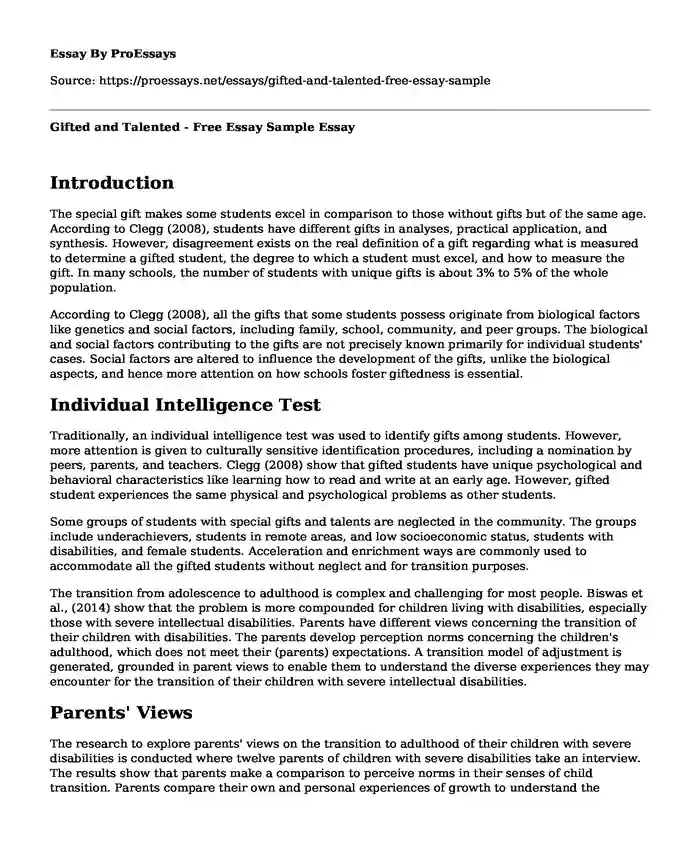Introduction
The special gift makes some students excel in comparison to those without gifts but of the same age. According to Clegg (2008), students have different gifts in analyses, practical application, and synthesis. However, disagreement exists on the real definition of a gift regarding what is measured to determine a gifted student, the degree to which a student must excel, and how to measure the gift. In many schools, the number of students with unique gifts is about 3% to 5% of the whole population.
According to Clegg (2008), all the gifts that some students possess originate from biological factors like genetics and social factors, including family, school, community, and peer groups. The biological and social factors contributing to the gifts are not precisely known primarily for individual students' cases. Social factors are altered to influence the development of the gifts, unlike the biological aspects, and hence more attention on how schools foster giftedness is essential.
Individual Intelligence Test
Traditionally, an individual intelligence test was used to identify gifts among students. However, more attention is given to culturally sensitive identification procedures, including a nomination by peers, parents, and teachers. Clegg (2008) show that gifted students have unique psychological and behavioral characteristics like learning how to read and write at an early age. However, gifted student experiences the same physical and psychological problems as other students.
Some groups of students with special gifts and talents are neglected in the community. The groups include underachievers, students in remote areas, and low socioeconomic status, students with disabilities, and female students. Acceleration and enrichment ways are commonly used to accommodate all the gifted students without neglect and for transition purposes.
The transition from adolescence to adulthood is complex and challenging for most people. Biswas et al., (2014) show that the problem is more compounded for children living with disabilities, especially those with severe intellectual disabilities. Parents have different views concerning the transition of their children with disabilities. The parents develop perception norms concerning the children's adulthood, which does not meet their (parents) expectations. A transition model of adjustment is generated, grounded in parent views to enable them to understand the diverse experiences they may encounter for the transition of their children with severe intellectual disabilities.
Parents' Views
The research to explore parents' views on the transition to adulthood of their children with severe disabilities is conducted where twelve parents of children with severe disabilities take an interview. The results show that parents make a comparison to perceive norms in their senses of child transition. Parents compare their own and personal experiences of growth to understand the transition of their children without considering the child's severe intellectual disabilities. The comparison leads to some parent expectations not met by the children at the age they expected.
The model's theoretical perspective developed to visualize the inter-related processes that patents should practice during their children's transition into adulthood is similar to the ideas it the other books. Biswas et al. (2014) in the book argue that parents should accommodate the behavioral changes that children develop in their different life stages. Therefore, the parent should avoid comparing their personal life experience during their transition to that of their children, and hence the theoretical perspective in the article is similar to that in that other book. The reading in the article challenges the assumption which parents make regarding the stage transition of their children. Biswas et al., (2014)shows that parents assume that all children in the same age bracket should transform into adulthood at the some time, regardless of their intellectual abilities. The article challenges the parents perspective since it indicates that children transform into adulthood depending on their different intellectual abilities.
Conclusion
There is a different perspective among people regarding the special gifts and talent which students possess. According to Biswas et al., (2014), Male students with special gifts and talents are more recognized than females in some communities. Furthermore, gifted students from families with high social status are identified earlier. In contrast, the others from low backgrounds and remote are neglected, and their parents have little understanding of their transition to adulthood challenges.
References
Clegg, J. (2008). Parental negotiations of the moral terrain of risk in relation to young people with intellectual disabilities. Retrieved from
https://doi.org/10.1002/casp.992
Biswas, S., Moghaddam, N., & Tickle, A. (2014). What are the factors that influence parental stress when caring for a child with an intellectual disability? A critical literature review. International Journal of Developmental Disabilities, 61(3), 127-146. Retrieved from
https://doi.org/10.1179/2047387714Y.0000000043.
Cite this page
Gifted and Talented - Free Essay Sample. (2023, Dec 12). Retrieved from https://proessays.net/essays/gifted-and-talented-free-essay-sample
If you are the original author of this essay and no longer wish to have it published on the ProEssays website, please click below to request its removal:
- Admission Essay Sample for Master of Journalism - Carleton University
- Ethical and Legal Rules on Nursing Essay
- School Experiences Essay Example
- The Difference Between Girls and Boys in ECD Essay Example
- Essay Sample on Emergency Departments: A National Stress & Concern
- Essay Example on Critical Thinking: Activated Ignorance & Intellectual Autonomy
- Essay Example on School Uniforms: An Ongoing Debate in the Contemporary World







